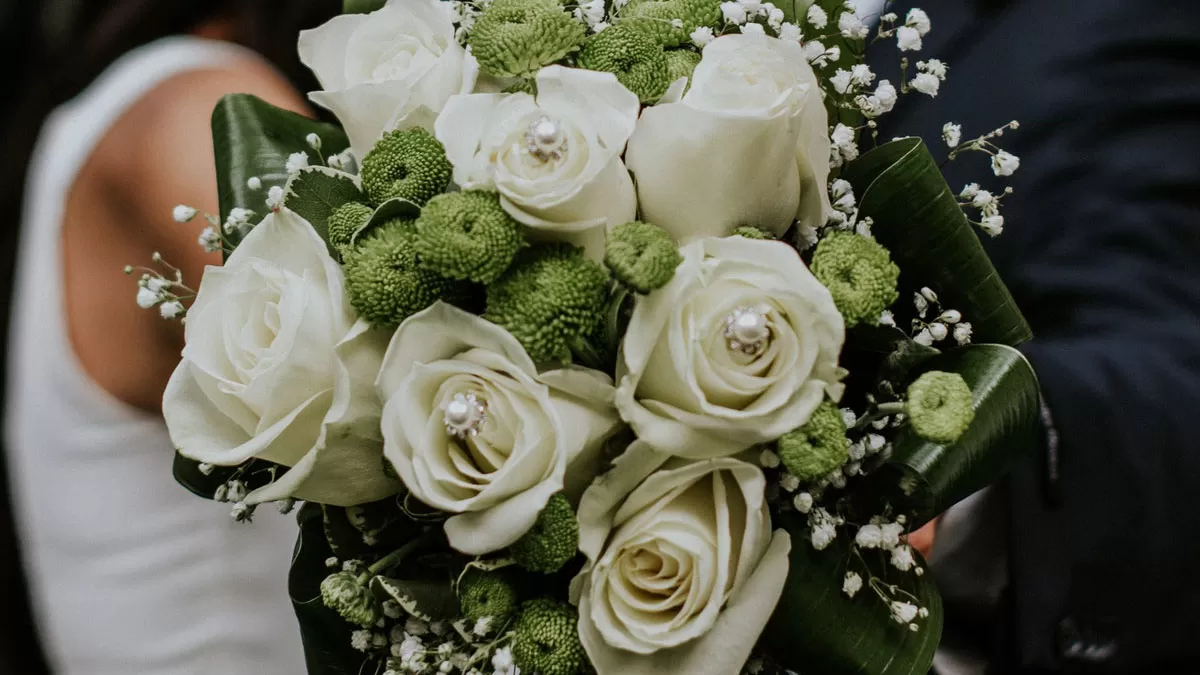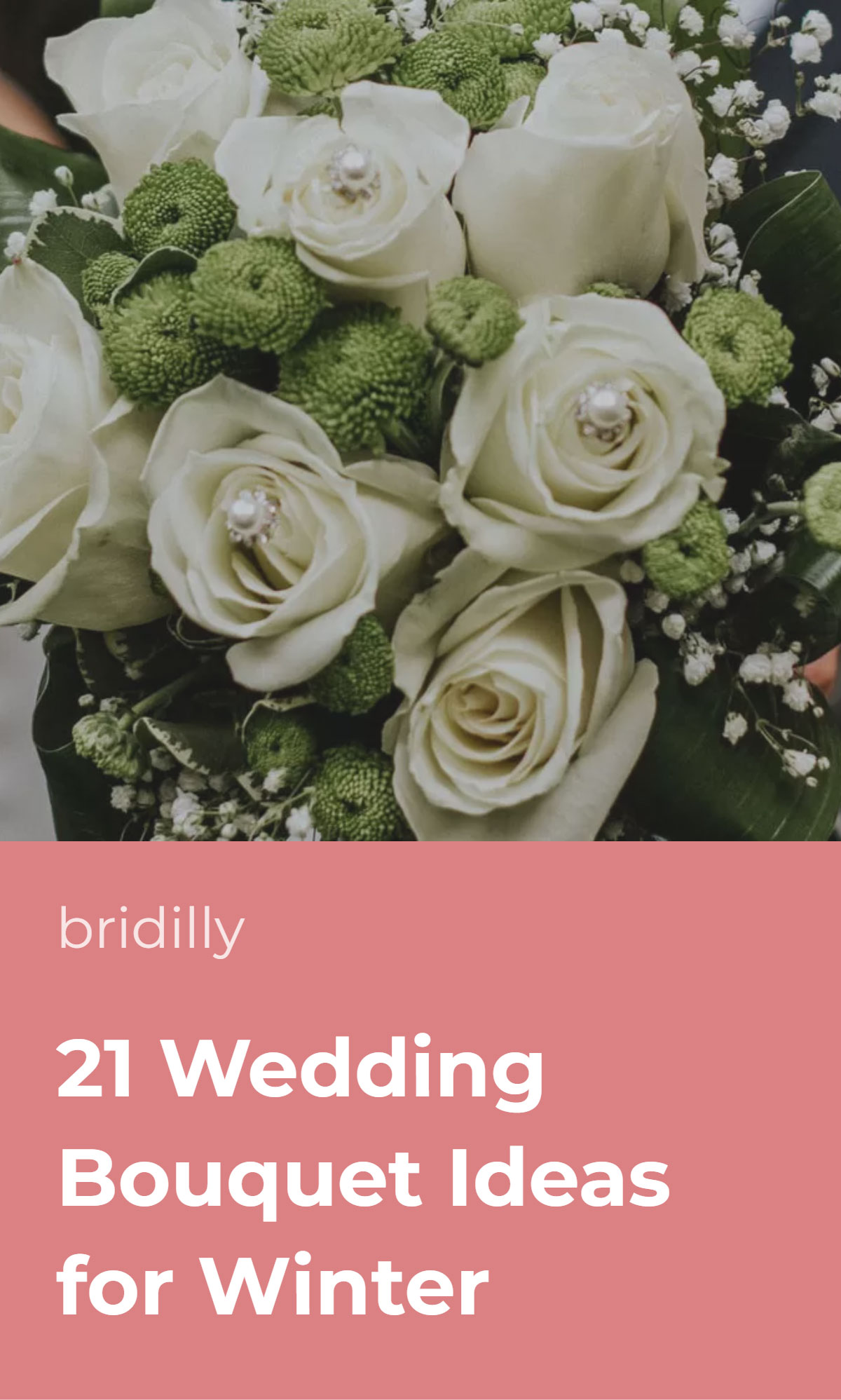Winter wedding bouquets’ ideas may seem limited, but only until you learn about all the gorgeous winter flower varieties.
The selection of seasonal winter flowers isn’t as vast as summer but undoubtedly beautiful, including anemones, amaryllis, calla lilies, and orchids.
Seasonal flowers embrace the winter’s unique appeal, are fresher, and are typically cheaper than out-of-season blooms.
Draw inspiration from sleepy winter nature – muted pastel and rich, dark hues, white snow, and evergreen boughs dictate the winter wedding floral arrangement trends.
When choosing your bouquet, don’t forget to consider your personality, wedding style, color theme, and location. The flowers should match the venue décor and your attire, not clash with them.
Table of Contents [show]
1. Burgundy Anemones, Marsala Orchids, Blue Thistle, & Protea
Winter is the perfect time to embrace darker berry and wine hues. Exotic orchids in rich marsala tone with proteas and burgundy anemones give off a dramatic feel, enhanced by the blue spiky thistle.
If you admire unusual floral arrangements, consider choosing a bouquet with cascading orchids. Alternatively, you may add non-flower accents like fern leaves, pampas grass, or ivy.
2. White Anemones, Burgundy Roses, Queen of the Prairie, & Greens
White anemones, also known as the “panda” variety, are one of the most popular winter wedding flowers due to their long vase life, versatility, and unique look. Combine them with traditional roses in rich burgundy color.
Queen of the prairie makes a perfect filler flower for this contrasting floral arrangement. Add greens of your choice, such as leather fern, ivy, dusty miller, or spruce branches.
3. Red Dahlias, Bottlebrushes, & Eucalyptus
Dahlias are available year-round and offer a vast selection of varieties and colors. Combine large fiery red or burgundy dinner plate dahlias with Callistemon, also known as bottlebrushes, for a minimalistic yet creative arrangement.
Muted green eucalyptus perfectly balances the saturation of red flowers and livens up the bouquet. However, cascading ivy, holly, or dusty miller will look equally well in this arrangement.
4. Baby’s Breath Bouquet
Gypsophila, also known as baby’s breath, typically serves as a filler flower but is equally suitable for minimalistic mono wedding bouquets.
The tiny clustered white blooms resemble a snowy cloud and perfectly fit a winter wonderland-style wedding.
While gypsophila only comes in white, florists can dye it in any color, so you can mix different shades if you prefer more colorful arrangements.
Baby’s breath is also a perfect choice if you plan to preserve your wedding bouquet because dry gypsophila lasts for years without changing its appearance.
5. Dark Scabiosa, Protea, Chocolate Cosmos, Thistle, & Pampas Grass
Continuing the dark and moody wedding bouquet idea theme, we present you with an exotic combination of textured scabiosa, protea, chocolate cosmos, and thistle in rich, dark shades of red and purple.
Dyed purple or red pampas grass perfectly fits this dramatic arrangement, adding texture and volume. Some alternatives to consider are leather fern leaves, dry camellia leaves, and spruce branches.
6. Lotus Pods, White Anemones, Dusty Miller, Dried Artichokes, White Spray Roses, & Eucalyptus
If you’re dreaming of an all-white winter wonderland wedding, consider a frosty combination of dried lotus pods, white “panda” anemones, white spray roses, dusty miller, dried artichokes, and eucalyptus.
This non-conventional bouquet is ideal for creative brides who find classic wedding flowers like roses and peonies overly generic.
7. Hellebores, Freesias, & Andromedas
Another name of hellebore is Christmas rose, indicating the flower’s seasonality. This stunning winter bloom comes in many colors, from white and pink to dark purple.
Freesias are popular year-round and, like hellebores, boast a wide range of hues. Mix these delicate winter wedding flowers with white or pink andromeda, also known as lily of the valley shrub.
A combination of nearly black hellebores, burgundy freesias, and blush hellebores is especially atmospheric, celebrating the dark appeal of the season.
8. Amaryllis, Lilies, Peonies, & Festival Bush
Amaryllis and lilies are an excellent choice for brides admiring exotic blooms. Both flowers come in numerous colors, including pure white, pink, spotted, and two-toned varieties.
Festival bush makes a perfect filler flower for an amaryllis and lily bouquet, featuring dozens of tiny bell-shaped blooms. Festival bush is always red and will look the best with white, red, or orange flowers.
9. Blush & Mauve Roses with Brunia Berries & Cedar Boughs
Winter wedding flowers tend to be either dark and moody or pastel and dreamy. Brides who prefer the latter will admire a winter woodland-inspired bouquet featuring blush and mauve garden roses, brunia berries, and cedar boughs.
This winter wedding bouquet is ideal for a romantic, modest bride admiring classics but fancying a twist. It will perfectly fit a traditional, whimsical, or bohemian wedding in neutral colors.
10. White Ranunculus, Cedar, Holly, Rosemary, & Seeded Eucalyptus
Garden flowers may be fragrant. However, a mix of cedar, rosemary, and seeded eucalyptus branches is not worse suitable for a holiday season wedding, creating a unique wintery aroma bouquet.
Incorporate white ranunculus into this aromatic green arrangement to brighten it up and give it a romantic feel. White roses, peonies, anemones, or hellebores are all valid alternatives.
11. Poinsettia, Evergreens, Pinecones, & Baby’s Breath
Getting married around Christmas is a special kind of fun. If you’re planning a December wedding, embrace the anticipation of holidays with a red poinsettia, evergreen bough, pinecone, and baby’s breath wedding bouquet.
This creative arrangement will beautifully match a traditional, holiday-themed, woodland, or rustic winter wedding. If you love the idea of incorporating evergreens into your bridal bouquet but find poinsettia too festive, replace it with red roses.
12. Red, Pink, & Purple Peony & Sweet Pea Mix
Saturated bouquets aren’t trendy among winter brides, but the vibrant mix of red, pink, and purple peonies and sweet peas is beyond gorgeous. This romantic textured floral arrangement will suit a feminine, playful bride.
Note that your flowers should match your wedding color scheme, so this bouquet will look the best at a red, pink, or purple-themed event. However, the peony and sweet pea combination work equally well in any other color.
13. White Lisianthus, Ranunculus, Privet Berry, Eskimo Roses, Camelia Leaf, & Kumquats
Lisianthus, ranunculus, and white Eskimo roses are popular year-round due to their longevity, cost-effectiveness, and versatility. However, many would find the combination of these flowers too unoriginal.
Rich emerald camellia leaves, black privet berries, and vivid orange kumquats are ideal accents for this snowy floral arrangement, making it creative and unique.
This bridal bouquet opens up anticipation of spring and is perfect for a late winter wedding.
14. Cascading Phalaenopsis Orchid Bouquet
Orchids are undoubtedly the most common exotic wedding flowers, notably the phalaenopsis variety with large blooms featuring rounded petals. Despite such popularity, an orchid bridal bouquet always looks modern and fresh.
Consider a creative cascading bouquet from snow-white phalaenopsis orchids for an elegant, clean look. Alternatively, mix purple, pink, and two-toned blooms to add a pop of color to your wedding.
15. Mono Calla Lily Mix
A mono calla lily arrangement is one of the most simple winter wedding bouquets and one of the most stylish. It’s a chic, minimalistic choice for brides who believe that less is more when it comes to wedding flowers.
You may use only pure white calla lilies if you value tradition or opt for a contrasting combination of white and dark plum blooms.
Consider two-toned calla lily varieties with plum center and white petal edges if you admire unusual flowers.
16. White Parrot Tulips, Anemones, Lamb’s Ears, Succulents, Cotton Sprigs, & White Berries
The prime time for tulips is spring, but late winter brides still have some varieties to pick from. Textured parrot tulips in pure white color beautifully pair with “panda” anemones in a delicate wintery bouquet.
Lamb’s ears, white berries, succulents, and cotton sprigs transform this wedding bouquet into an art piece that will help to create a winter wonderland atmosphere.
17. Polo Roses, Brunia Berries, Freesia, & Pepper Berries
White polo roses and freesia are popular wedding flowers excellent for a traditional bride. Incorporate black brunia berries and pepper berries into the bouquet as accents.
18. Bells of Ireland, Green Hydrangea, Delphinium, Camelia Leaves, & Blue Thistle
Green is largely underused in winter weddings. However, it’s rather appropriate for a late winter affair, embracing the anticipation of warm spring days.
Mix bells of Ireland and green hydrangea with blue delphinium and thistle in an asymmetric wedding bouquet. Dark green camellia leaves will complete this unusual, voluminous arrangement.
19. Burgundy Calla Lilies & Peonies with Dusty Miller
Calla lilies are versatile flowers because they go equally well with other exotic blooms and popular garden flowers like peonies.
While the combination of burgundy calla lilies and peonies with dusty miller isn’t the most obvious, the elements surprisingly well tie together in a creative winter wedding bouquet.
20. Mauve, Peach, and Cream Sweet Pea, Ranunculus, Spirea, & Hellebore Mix
Pastels are always a good idea for a wedding, regardless of the season and style.
A delicate mauve, peach, cream ranunculus, sweet pea, and hellebore bouquet accented with spirea mimics the hues of a winter sunrise.
21. Dried Echinops, Pampas Grass, & Globe Thistle
After all, your wedding bouquet doesn’t have to feature garden flowers.
Consider an unconventional mix of dried Echinops, globe thistle, and pampas grass for a rustic or alternative winter wedding.
















No Comments Add one
Leave a Comment